- Home
- Middle East News
- About USA Weekly News
- World News
- INLNews News Headlines
- Benjamin Netanyahu Israel
- US Politics
- UK Ireland News
- Saleh al-Arour killed
- Israel Genocide ICJ Case
- Israel Mossad Hamas Cash
- INLTVNews VideosP1
- Netanyahu RothschildCrime
- Pippin Drysdale Artist
- Wayne Hastings CarewReid
- Lloyd Carew-Reid Music
- Adam Carew-Reid Business
- Hidden Tribes In the USA
- Trump Shooting Analysis
- Irish Crime Exposed
Welcome to USA Weekly News!
US Politics Part One
USA Weekly News - US Politics
US Politics
GOP REP. DEMANDS ANSWERS FROM BIDEN ADMINISTRATION ON CATHOLIC PRIEST IMPRISONED 26 YEARS: ‘INNOCENT MAN’
December 3, 2023

A Republican congressman is calling on Secretary of State Antony Blinken to take action and explain steps being taken to free a Catholic priest the international community says has been wrongfully imprisoned in Nicaragua.
"I am gravely concerned about the overall state of religious freedom in Nicaragua and write today inquiring about the wellbeing of His Excellency Rolando Álvarez Lagos, Bishop of Matagalpa, a prisoner of conscience who remains wrongfully detained by the brutal — and criminal — Ortega-Murillo regime in Nicaragua," GOP Rep. Chris Smith wrote in a letter to Blinken this week.
Smith is demanding answers about what the Biden administration is doing to free Álvarez.
A court in Nicaragua sentenced the Roman Catholic bishop earlier this year to more than 26 years in prison for alleged treason after he refused to be exiled to the United States.
Álvarez was among several priests and seminarians arrested last year as the government of Nicaragua clashed with the clerics of the Catholic Church who have criticized the regime.
Álvarez refused to join four other priests and 222 other political prisoners expelled to the U.S. as part of a prisoner exchange with the U.S. State Department, according to the Catholic News Agency.
The bishop said he chose to remain in his country in protest against other Catholics who are being persecuted by the Nicaraguan government.
The bishop said if he boarded the plane, it would be admitting he was guilty of a crime he never committed, according to a person close to Álvarez who asked not to be identified out of fear of reprisal.
Ortega has alleged Catholic leaders were involved in a plot to overthrow him, citing their role as mediators with protest groups following the 2018 protests in the country that resulted in about 300 deaths.
"Bishop Álvarez is an innocent man enduring unspeakable suffering," Smith said during a House hearing he held Thursday where members heard testimony from Nicaraguan exiled prisoners of conscience and their relatives.
"His life and ministry have been an inspiring example of compassion, kindness, integrity and selfless service."
In March, Pope Francis compared Álvarez's imprisonment to Hitler’s regime and called Ortega "unstable."
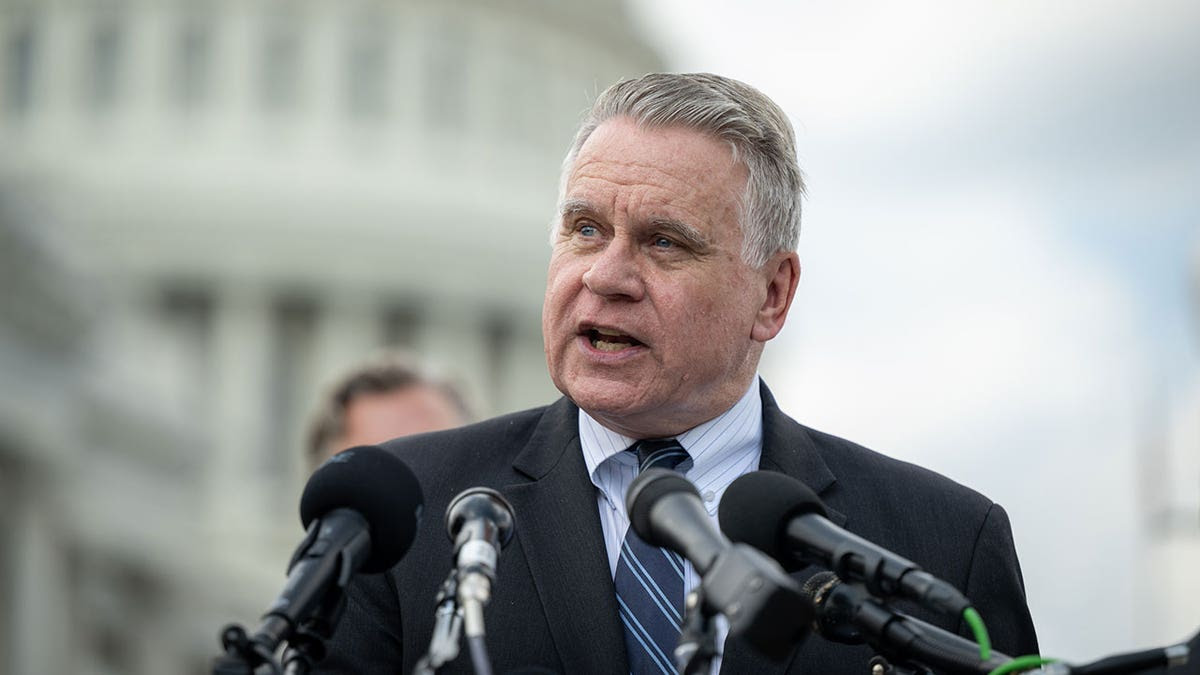
Rep. Chris Smith (Fox News )
"Given this disturbing trend of oppression, I respectfully request an explanation of what actions the Biden Administration is undertaking to advocate on behalf of Bishop Álvarez — and to compel the Ortega-Murillo regime to immediately release him from prison," Smith wrote before providing 15 questions for the Biden administration to answer by Dec. 21.
The questions included, "Does the State Department possess information on the current location and wellbeing of Bishop Álvarez? …. If so, where is Bishop Álvarez being held?"
Other questions posed in the letter:
• "Has the State Department filed a formal inquiry with the Nicaraguan government concerning the status of Bishop Álvarez?"
• "Has the State Department received any formal request for assistance from the Vatican to petition for the release of Bishop Álvarez?"
• "What is the Department doing to advocate for the release of Bishop Álvarez?"
Smith also asked for information related to economic ties with Nicaragua given the Ortega regime’s human rights abuses.
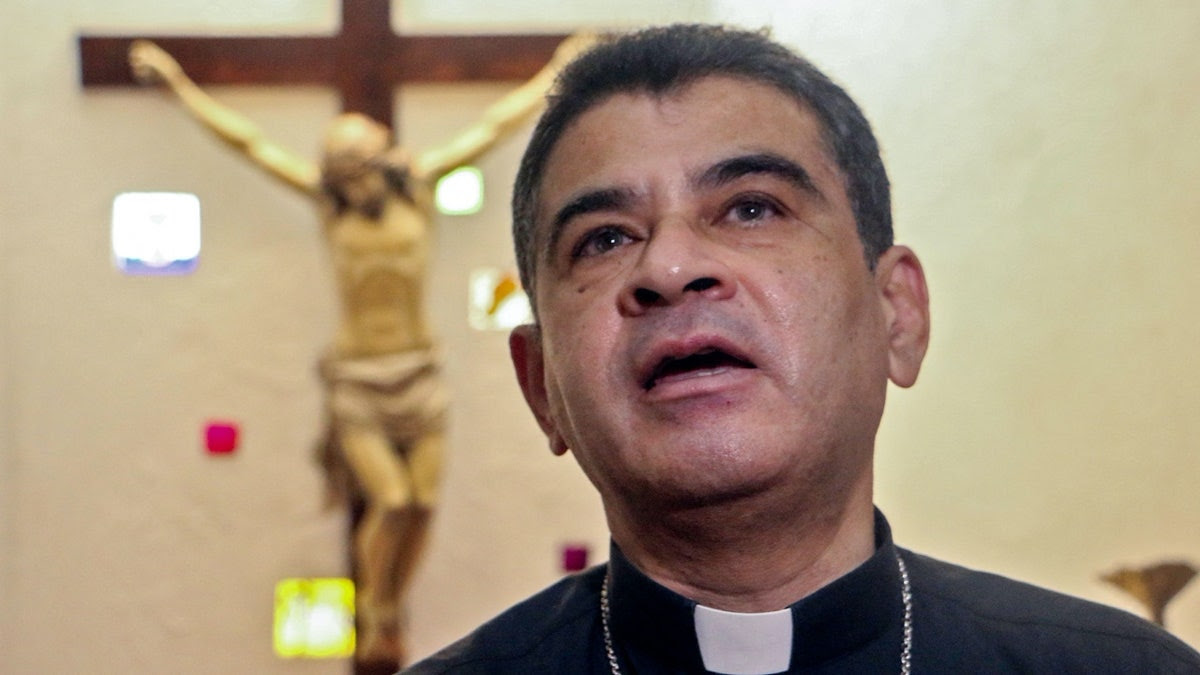
Rolando Álvarez Lagos (STR via Getty Images)
"The United States needs to act quickly and use every tool at our disposal," Smith said at the hearing. "The international community can no longer turn a blind eye to what is happening to the people of Nicaragua, including and especially people of faith."
A State Department spokesperson told Fox News Digital the letter was received but that the department does not comment on congressional correspondence.
The spokesperson added that the department calls for the "immediate" and "unconditional" release of Álvarez and all others "wrongfully detained."
POLITICS

A Republican congressman is calling on Secretary of State Antony Blinken to take action and explain steps being taken to free a Catholic priest the international community says has been wrongfully imprisoned in Nicaragua."I am gravely concerned about the overall state of religious freedom in Nicaragua and write today inquiring about the wellbeing...

They're two relatively young and very high-profile governors of large states who have a knack for grabbing national attention and firing up the bases of their respective political parties.Democratic Gov. Gavin Newsom of California and Republican Gov. Ron DeSantis of Florida, who have been trading fire for nearly two years, will tangle once...

A reporter asked me the other day if all the evidence about the Biden family’s money-making schemes (checks, secret messages, and meetings) meant that President Biden has been lying to the public. I was surprised by the question. Of course, Biden has been lying.As I wrote early this year, the Bidens are the...
 Hunter Biden's legal team called on the judge overseeing his Delaware firearm charges case to subpoena former President Donald Trump and several former Trump administration officials on Wednesday.Biden attorney Abbe Lowell argues that the investigation into the president's son arose only due to "incessant, improper, and partisan pressure." In addition to Trump, Biden...
Hunter Biden's legal team called on the judge overseeing his Delaware firearm charges case to subpoena former President Donald Trump and several former Trump administration officials on Wednesday.Biden attorney Abbe Lowell argues that the investigation into the president's son arose only due to "incessant, improper, and partisan pressure." In addition to Trump, Biden...

Republicans on the House Judiciary Committee have issued a subpoena for a top Justice Department prosecutor investigating Hunter Biden who allegedly tried to shield President Biden from certain questions, inquiries and search warrants related to the investigation, Fox News Digital has learned.According to the subpoena, which Fox News Digital reviewed Tuesday, Assistant U.S....

Sen. Eric Schmitt, R-Mo., is pressing the U.S. Army for answers on behalf of former service members who were discharged for refusing the COVID-19 vaccine.Nearly 2,000 service members were let go from the military after refusing to take the COVID-19 vaccine. Amid recruitment troubles in 2023, the Army recently sent a letter to...

Florida governor Ron DeSantis is upping his game on the campaign trail in Iowa, away from his home state in Florida. Voters in the two states say they support him — but for contrasting reasons.Iowa residents who support DeSantis told Fox News they admired his willingness to be tough on the U.S. border...

CONCORD, N.H. - The clock is ticking for Rep. Dean Phillips of Minnesota, who's seriously mulling a 2024 Democratic primary challenge against President Biden. Phillips last week missed a deadline to place his name on the ballot in Nevada, which is holding its presidential primary on Feb. 6 in the Democratic Party's nominating calendar.

The House of Representatives is expected to convene for a third round of votes on Friday as Judiciary Chairman Jim Jordan, R-Ohio, struggles to reach the 217-member threshold needed to win the speaker’s gavel.House lawmakers got a notice on Thursday evening that no more votes would be expected that day after hours spent...

House Judiciary Committee Chairman Jim Jordan, R-Ohio, faces an unclear path to the speakership after securing the GOP nomination.In the chaotic fight to replace recently ousted Speaker Kevin McCarthy, R-Calif., Jordan has been making calls to shore up support for his bid after House Majority Leader Steve Scalise, R-La., the initial nominee, bowed...
TOP STORIES
HEAT TURNS UP ON U.S. TREASURY MARKET DEBATE AROUND HEDGE FUND COLLATERAL
Federal jury awards $17.7 million to Kraft, other suppliers after major price-fixing conspiracy
‘Frasier’ star Kelsey Grammer says Tim Allen, Roseanne Barr inspired him to revive sitcom
NFL Week 13 preview: Eagles and 49ers headline docket with NFC championship rematch
Robot chemist could create oxygen needed for colonizing Mars: study
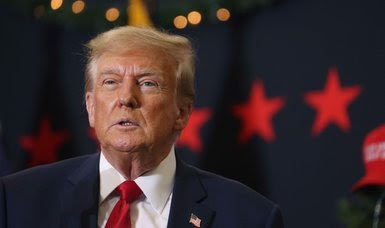
U.S. voters link Trump's possible second term with "revenge"
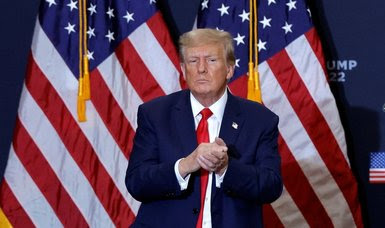
Trump set for unprecedented 2024 campaign as legal jeopardy mount
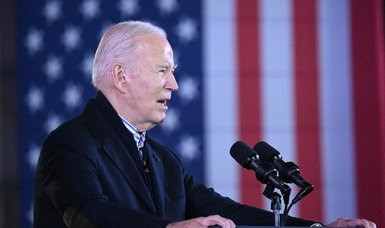
Biden: 'No question' Trump supported Jan. 6 riots
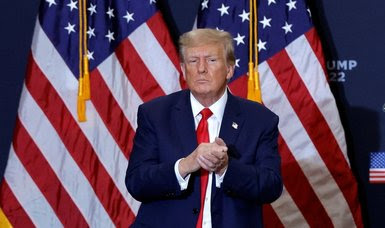
Colorado court blocks Trump from primary ballot
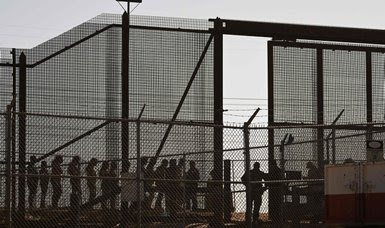
Texas governor signs law allowing to arrest illegal immigrants

Cost of Trump's election lies approaches nearly $1 Billion
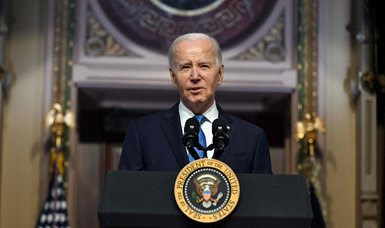
US House authorizes formal impeachment inquiry into Biden
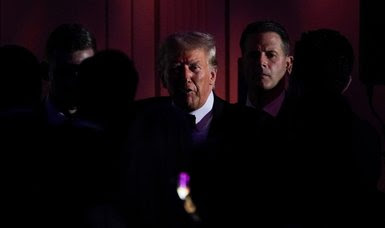
US asks Court to review Trump's immunity claim to speed his case
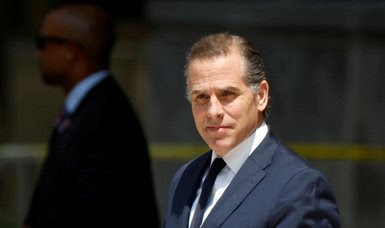
Grand jury indicts Hunter Biden on 9 federal tax counts

Gaza near humanitarian 'collapse,' : UN migration agency

Russia claims Ukraine behind blasts at railway line in Buryatia
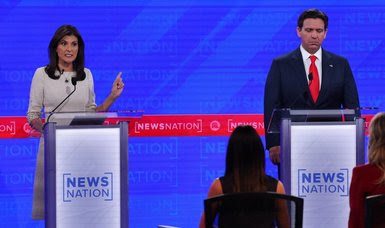
4 Republican candidates come out swinging at 4th debate
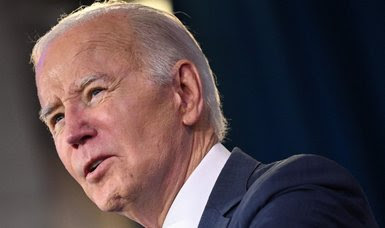
Congress needs to pass supplemental funding for Ukraine: Biden
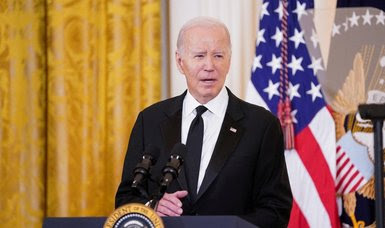
Biden unsure about reelection if Trump isn't running
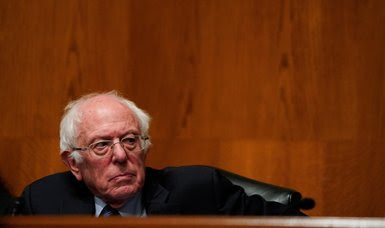
US Senator Sanders objects to $10.1 billion aid to Israel
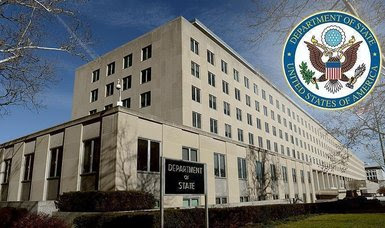
'Putin won't make peace before 2024 U.S. election'
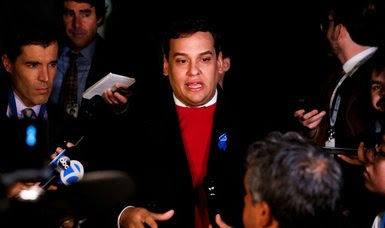
US Republican lawmaker Santos says Congress full of ‘felons’

New York mayor denies sex assault claim

Biden, Trump unpopularity buoys 3rd party hopes for 2024

US House votes to avoid government shutdown

Trump's Georgia election trial might not conclude until 2025

400 US officials send letter to Biden opposing Israel policy

Top US House Republican Johnson endorses Trump for president

Trump's older sister -- an ally and critic -- dies aged 86

Biden revs up union support against Trump

US diplomats write memo criticizing administration's Israel policy

Biden's support among Arab Americans plummets after supporting Israel

Democratic candidates running for US president in 2024

Trump to implement 'ideological screenings' for immigrants

Israeli president complains to British premier about BBC

Outrage grows over U.S.-funded massacres in Gaza

Jim Jordan fails in second bid for US House speaker

Donald Trump returns to New York for civil fraud trial

Superseding indictment accuses Senator Menendez of foreign agent activities

Biden interviewed regarding classified documents probe

Robert F. Kennedy Jr. announces independent run for US president

McCarthy not to resign from House after ouster as speaker

McCarthy expected to step down from Congress

Hunter Biden pleads not guilty to gun charges

Donald Trump returns for second day of civil fraud trial

McCarthy thinks he will survive leadership challenge

US senators hope to meet with Xi during China trip next week

Republican Rep. Gaetz moves to oust McCarthy as speaker

Trump business empire under threat as fraud trial opens

USA Weekly News-US Politics Part Two
More

Sun 24 Dec 2023
On a cold night in November, a man named Jefferson Davis addressed a crowd of conservative activists gathered in an American Legion hall 20 miles north of Milwaukee. In his left hand, Davis brandished an unusual prop.

“In this diaper box are all the receipts for the illegal absentee ballots that were put into the Mark Zuckerberg drop boxes all over the state of Wisconsin,” said Davis.
Behind him, a long table stacked with papers, binders and a small pile of doorknobs stretched across the hall. They were for theatrical effect: the doorknobs were a tortured analogy for the multiple conspiracy theories Davis had floated, and the diaper box was a visual stand-in for the ballot drop boxes Wisconsin voters used across the state in 2020. The paperwork, Davis insisted, contained the evidence of an enormous plot to steal the 2020 presidential election from Donald Trump in Wisconsin. His audience of more than 70 people, including local and state-level elected officials, sat rapt.
Davis was speaking at an event organized by Patriots of Ozaukee County, a rightwing group that vows to “combat the forces that threaten our safety, prosperity and freedoms” and compares itself to the musket-toting Minutemen of the revolutionary war.
The organization is one of more than 30 such “patriot” groups in Wisconsin identified by the Guardian which claim that the last presidential election was stolen from Donald Trump. Many, including the Ozaukee county organization, openly embrace Christian nationalist rhetoric and ideology, arguing that the laws of the US government should reflect conservative Christian beliefs about issues like abortion and LGBTQ+ rights.
Their religious interpretation of the US’s founding has propelled these groups not only into fights over elections administration but also against vaccine requirements and protections for transgender people.
We were tired of the GOP, because they’re not really an activist organization
Scott Rishel Patriots of Ozaukee County
Now, with the 2024 presidential election less than a year away, Wisconsin’s patriot movement and its allies are fighting for legislation that they believe will protect the state’s electoral process from fraud, and mobilizing supporters to work the polls, observe polling places and spread the word about their concerns – pushing the GOP further to the right and threatening more challenges to the voting process come election day.
Patriots of Ozaukee County was created in March 2021 by local activists who were “upset about the election”, said Scott Rishel, who founded the group. He felt there was nowhere he could speak freely about the 2020 election, or things like Covid-19 vaccines and masks. Plus, he said: “We were tired of the GOP, because they’re not really an activist organization.”
At the urging of a friend, he convened the group’s first meeting.
“With the 2020 election and Covid tyranny, that all opened my eyes,” he told the crowd of mostly older couples at the November event. “The silent majority was killing us. It was killing our country, killing our community. And we needed to learn how to no longer be silent.”
By “we”, Rishel meant conservative Christians. “Jesus Christ is my savior, my lord. It’s amazing how some people didn’t have the courage to say that – they think it’ll make people uncomfortable.”
Their movement of biblically motivated patriots has since roared to life, winning some powerful allies along the way.
In attendance at the Ozaukee county meeting was the state senator Duey Stroebel, the vice-chair of the state’s powerful joint committee on finance. Stroebel, who has refrained from actually endorsing Trump’s false claims that the 2020 election was stolen, has nonetheless backed numerous bills to restrict voting access, invoking the heightened anxiety on the right about election security to justify their passage.
Nearly two hours into the meeting, Stroebel interjected. “One thing you might want to comment on is ranked-choice voting,” he said, voicing his opposition to a bipartisan effort in the legislature to adopt the voting method used in states including Maine and Alaska that allows voters to rank their preference on multiple candidates. The method ensures the winning candidate wins a majority rather than a plurality of the vote and essentially eliminates the risk of third-party candidates spoiling an election result.
“Senator Stroebel is referring to what’s called ranked-choice voting,” Davis told the crowd. “What I call it is ‘guarantee that Democrats win’.”
To members of this movement, this proposal is just the latest suspicious attempt to change the voting system to steal elections.
Hardline conservatives have grown increasingly convinced that the election system is rigged against them, largely because Trump has pushed those claims hard since the 2020 election. And in spite of the fact that there was no evidence of significant voter fraud in recent American elections, it has also mobilized local groups into action across the US.
Amy Cooter, a Middlebury College professor whose research focuses on militias and local rightwing groups, described the rise of patriot groups across the country as “a backlash movement”. After 2020, said Cooter, local rightwing groups have been motivated largely by “the last presidential election and thoughts that it was stolen – plus concerns that future elections might similarly be”.
The patriot movement in Wisconsin appears to be growing. Attendees at November’s meeting were unsurprised by the packed house: closer to 200 had attended the Ozaukee group’s last event in October, which featured a long lineup of speakers including Davis.
Free daily newsletterOur US morning briefing breaks down the key stories of the day, telling you what’s happening and why it matters
Privacy Notice: Newsletters may contain info about charities, online ads, and content funded by outside parties. For more information see our Privacy Policy. We use Google reCaptcha to protect our website and the Google Privacy Policy and Terms of Service apply.after newsletter promotion
Patriot groups in Wisconsin have found an awkward alliance with Republican officials and prominent activists in the state. A July gathering hosted by the Barron county Republican party, located across the state in north-west Wisconsin, drew closer to 500. That event, which included free beer and a gun raffle and was promoted by patriot groups, illustrated the common cause the movement’s activists have found with the grassroots of the GOP.
The Brown county Republican party, in the north-east of the state, has hosted Constitution Alive! events, which patriot organizations advertised broadly. (A spokesperson said the local GOP is formally unaffiliated with patriot groups.)
“As you know, I travel the whole state,” Davis told me in December. “And everywhere I go, I’m either asked to speak by patriot freedom groups, or Republican party chapters. And most of the time both groups show up.”
Many patriot groups in the state are animated by the Christian nationalist viewpoint.
Patriots of Ozaukee County declares on its website that it views as fundamental “truths” that “God is our creator” and “Jesus is our savior”. The Ozaukee county group has also hosted Constitution Alive! events touting the claim that the US constitution is a Christian document – led by the Patriot Academy organization, a Christian nationalist group that also offers weapons courses.
They’re not alone. Patriots United, a group in Eau Claire, Wisconsin, exemplifies the typical rhetoric of the Christian right, describing its membership as “constitutional conservative Christians who seek to glorify and honor God” with the explicit aim of increasing “Christian influence” in local government.
Another Wisconsin patriot group called North of 29 has begun to put into action the work that Davis advocates. With the help of groups affiliated with Mike Lindell, the MyPillow CEO and conspiracy theorist, the group has begun canvassing neighborhoods for voter fraud, using data that they refuse to share publicly to identify instances of suspicious activity. (A similar group in Colorado has been sued in federal court for allegedly going “door-to-door around Colorado to intimidate voters”, a practice the suit argues violates the Ku Klux Klan Act.)
Most prominent elected Wisconsin Republicans have refused to outright endorse Trump’s claims that the 2020 election was stolen. But they have invoked the fears of election fraud to justify passing restrictive voting legislation that election-denying activists have clamored for.
One bill, passed by the legislature and vetoed by the Democratic governor, Tony Evers, in 2022, would have made it harder for people to qualify as “indefinitely confined”, a status disabled voters can claim to receive an absentee ballot. During the 2020 election, during the peak of the Covid pandemic, the number of people who described themselves as indefinitely confined so they could vote from home increased dramatically – a fact that became a central point in conspiracy theories about the election. They’ve also tried to ban the use of private grants to help fund elections, keying off another conspiracy theory driven by money donated by Mark Zuckerberg’s foundation to local offices for election administration; Evers vetoed a bill to ban such money, but the legislature has now advanced the ban as a constitutional amendment which will be considered by voters this spring.
Republicans in the legislature also unsuccessfully tried to force out Meagan Wolfe, the state’s nonpartisan top elections official who became the target of conspiracy theorists and election deniers after 2020.
During his November presentation in Grafton, Davis handed out a pamphlet listing 53 issues that voters concerned about election security should focus on in Wisconsin. The priorities, which Davis and other election-denying groups across in the state have embraced, range from abolishing the bipartisan Wisconsin elections commission to requiring ballots cast in state and local elections to be counted by hand.
Davis’s recommendations might prescribe technical changes to elections administration. But he cast their importance in starkly biblical terms.
“I don’t know where you are with the Lord, and I mean this sincerely: you better pray,” said Davis. If the 2024 election wasn’t conducted “the correct way”, he warned, “there’s going to be you-know-what to pay.”
This article was amended on 26 December 2023. Brown county is in north-east, not north-west, Wisconsin as an earlier version said.
Explore more on these topics
In depth

- Underdog contender for Democratic nomination says Biden ‘cannot win’ against Trump

- Anti-democracy playbook has new threats in store for the US in 2024

- How Trump’s anti-immigrant rhetoric is taking over the Republican party

- Democrats won Virginia on abortion. Can it also win them the White House?
Most viewed
- US
- World
- Environment
- US Politics
- Ukraine
- Soccer
- Business
- Tech
- Science
- Newsletters
- Wellness
- News
- Opinion
- Sport
- Culture
- Lifestyle
Original reporting and incisive analysis, direct from the Guardian every morningSign up for our email
- Help
- Complaints & corrections
- SecureDrop
- Work for us
- Privacy policy
- Cookie policy
- Terms & conditions
- Contact us
- All topics
- All writers
- Digital newspaper archive
- YouTube
- Newsletters
- Advertise with us
- Search UK jobs
Back to top© 2023 Guardian News & Media Limited or its affiliated companies. All rights reserved. (dcr)
 Michigan supreme court rules that Trump will stay on state ballot1h ago
Michigan supreme court rules that Trump will stay on state ballot1h ago Vivek Ramaswamy stops spending on TV ads weeks before key contests1h ago
Vivek Ramaswamy stops spending on TV ads weeks before key contests1h ago ‘History is not what happened’: Howell Raines on the civil war and memory2h ago
‘History is not what happened’: Howell Raines on the civil war and memory2h ago Top Trumps: the 10 worst things the former president said this year4h ago
Top Trumps: the 10 worst things the former president said this year4h ago Shame: The Politics and Power of an Emotion by David Keen review – Trumpism’s lifeblood5h ago
Shame: The Politics and Power of an Emotion by David Keen review – Trumpism’s lifeblood5h ago Former congressman Jeff Fortenberry’s conviction reversed by appeals court
Former congressman Jeff Fortenberry’s conviction reversed by appeals court
 Will Trump provoke a crisis of legitimacy for the US supreme court?
Will Trump provoke a crisis of legitimacy for the US supreme court?
Sidney Blumenthal Are we laughing at George Santos or is he laughing at us?
Are we laughing at George Santos or is he laughing at us?
Arwa Mahdawi Trump shouldn’t be eligible to run again. But America’s highest court may disagree
Trump shouldn’t be eligible to run again. But America’s highest court may disagree
Margaret Sullivan180 Is barring Trump from office undemocratic? Let’s assess point by point
Is barring Trump from office undemocratic? Let’s assess point by point
Jan-Werner Müller413

Trump business empire under threat as fraud trial opens

Curtain comes up on new term for conservative US Supreme Court

US president signs short-term spending bill to avert shutdown

US House fails to pass McCarthy's temporary spending bill

Zookeeper dies after apparent lion attack in Japan

Trump, in campaign mode, attempts to back off abortion

Melania Trump renegotiated with Donald Trump ahead of elections

"US government shutdown would 'impact' Ukrainian pilot training"

US Senate secures votes to advance temporary government funding bill

Biden administration to take new actions against antisemitism

Trump committed fraud by inflating value of assets: judge

Biden's team is on a mission to prevent him tripping

Newsom's ties to Hunter Biden surface as he explains business deals

New poll shows Trump leading Joe Biden in 2024 race

Trump opposes US request to limit his comments on election case

Biden blames Republicans for threatening govt shutdown

Hunter Biden will plead not guilty to gun charges, attorney says

Top House Republican Kevin McCarthy faces crucial test

Ukraine faces very high bar to expel all Russians - general

Top US House Democrat sees Republican 'civil war'
US Politics Part Three

Trump business empire under threat as fraud trial opens

Curtain comes up on new term for conservative US Supreme Court

US president signs short-term spending bill to avert shutdown

US House fails to pass McCarthy's temporary spending bill

Zookeeper dies after apparent lion attack in Japan

Trump, in campaign mode, attempts to back off abortion

Melania Trump renegotiated with Donald Trump ahead of elections

"US government shutdown would 'impact' Ukrainian pilot training"

US Senate secures votes to advance temporary government funding bill

Biden administration to take new actions against antisemitism

Trump committed fraud by inflating value of assets: judge

Biden's team is on a mission to prevent him tripping

Newsom's ties to Hunter Biden surface as he explains business deals

New poll shows Trump leading Joe Biden in 2024 race

Trump opposes US request to limit his comments on election case

Biden blames Republicans for threatening govt shutdown

Hunter Biden will plead not guilty to gun charges, attorney says

Top House Republican Kevin McCarthy faces crucial test

Ukraine faces very high bar to expel all Russians - general

USA Weekly News-US Politics Part Four
USA Weekly News-US Politics Part Four

Top US House Democrat sees Republican 'civil war'

Biden to host Ukraine's Zelenskyy at White House next week

Jean-Pierre faces criticism for avoiding questions about Biden

Next phase of impeachment inquiry: Pursuit of Biden's personal bank records

Hunter Biden facing three federal gun charges in indictment

Hunter Biden files lawsuit against former Trump White House aide

Biden: 'Republicans want to impeach me to shut down the government'
Trump's allegations at heart of Biden impeachment push

Despite political danger, Biden sticks by son Hunter

House speaker McCarthy announces formal investigation into Biden

Türkiye rescues 145 irregular migrants in Aegean Sea

Trump seeks disqualification of US judge in federal election case

Researchers Unearth Enigmatic 'Golden Orb' on the Alaskan Seafloor

Nancy Pelosi, 83, announces candidacy for re-election to congress in 2024

US says no terms ready for normalization between Israel, Saudi Arabia

Ex-Trump official found guilty of contempt of Congress over Jan. 6

Feds mayuse Hunter Biden’s gun charge to ‘leverage’ another deal

US conducting 'precautionary' repositioning of forces in Niger: Pentagon

"China may be behind accounts seeking to sway US voters"

U.S. special counsel to indict Hunter Biden by month's end

US voices concern over Iran's 60% uranium enrichment

US VP Harris: US will continue to press Myanmar to foster democracy

Former Proud Boys leader sentenced to 22 years in prison in Jan 6 case

Majority of voters believe Biden too old for second term: Poll

Biden says he is not worried about an auto strike

U.S. Department of Health recommends easing cannabis restrictions

NYC mayor urges Biden to expedite work permits for asylum seekers

Proud Boys leader Joe Biggs sentenced to 17 years

Trump pleads not guilty in Georgia election racketeering case

Republican senator freezes again during press conference

Miami Mayor Francis Suarez suspends his presidential campaign
 Biden meets with King's family at the White House
Biden meets with King's family at the White House

US President Bidem condemns Florida racist shooting

Trump campaign says it raised $7.1 mn after mug shot

Biden campaign will not concentrate on Trump's legal woes, aide says

Trump turns himself in to face Georgia election interference charges

Trump assails Biden, Republican rivals during Carlson interview

USA Weekly News-US Politics Blog
Stay up-to-date with the latest news and trends in the Mass Media industry with our informative blog posts.

BIDEN GOES OFF-SCRIPT AFTER HIS SPEECH — IT’S WORSE THAN YOU COULD IMAGINE

JILL BIDEN’S EX-HUSBAND DROPS BOMBSHELL CLAIM ABOUT BIDEN CRIME FAMILY

EVIDENCE SHOWS BIDEN CONSPIRED TO DEFRAUD AMERICAN VOTERS. WHERE’S HIS INDICTMENT?
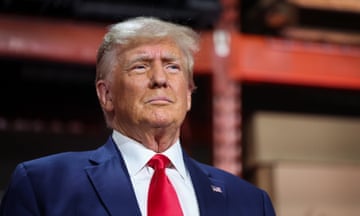
Michigan supreme court rules that Trump will stay on state ballot OPINION Troubling Poll Reveals Dark Reality: ‘There Is A Cancer In The American Body Politic’, ByAndrew Sanders OPINION Troubling Poll Reveals Dark Reality: ‘There Is A Cancer In The American Body Politic’, ByAndrew Sanders Troubling Poll Reveals Dark Reality: 'There Is A Cancer In The American Body Politic' - Analyzing America https://www.analyzingamerica.org/2023/12/731496/ A recent poll by DailyMail.com revealed that about one in five young Americans have a positive view of Osama Bin Laden, the mastermind behind the 9/11 attacks.The survey also found that a significant portion of Gen Z voters believe his views were a “force for good.”This trend has raised concerns among family members of 9/11 victims, who fear a growing sympathy towards terrorists in the younger generation.
- (Trending: Joe Biden Emailed Hunter’s Business Associates 54 Times)
- The results also indicate a shift in attitudes, with examples of younger Americans questioning Bin Laden’s actions and justifying his motives.Critics attribute this to a lack of comprehensive education about the events of 9/11 and the involvement of parties like Saudi Arabia.“It is hard to avoid the conclusion that there is a cancer in the American body politic: a small but sizeable group of its youngest voters,” James Johnson, founder of J.L. Partners said.
- “Polling has found that 18-29-year-olds are most likely to deny the Holocaust and, in our October Daily Mail poll we found that Gen Z Americans are more likely to sympathize with Hamas.”
“And now we have this on Osama Bin Laden, the man behind the biggest attack on American soil in its history.”
“A few weeks ago his writings went viral, with young Americans praising the Islamist leader. Some wrote that off as a few shrill voices on social media, others suggested it was fake.”
“This poll shows that was no fad, but a reflection of real opinion amongst one in five 18-29-year-olds.”
The poll has sparked worries about the normalization of terrorism among the youth, with calls for greater transparency and accountability regarding the attacks.
Democrat Found Guilty In Corruption Trial
Joe Biden Emailed Hunter’s Business Associates 54 Times
Trans Athlete Breaks College Record After Joining Women’s Team
OPINION
Trump Advisers And Colorado Republicans Huddle After Shock Ruling
By Andrew Sanders

Top officials from Donald Trump’s campaign and the Colorado Republican Party discussed plans after the Colorado Supreme Court’s decision to remove Trump from the Republican primary ballot.
The Colorado GOP plans to appeal the decision and potentially hold a caucus instead of a primary election.
“I certainly expressed to Clayton you know, Colorado Republicans would love to see [Trump] come out so that they can, you know, give them a good show of support. And I’m sure he’ll go ahead and pass that on to the president,” Dave Williams, chair of the Colorado GOP said.
- (Trending: Founding Dixie Chick Member Dies Unexpectedly)
“We would welcome him to come out but we understand if he needs to focus on Iowa.”
Trump’s aides see the decision as a legal nuisance and a political opportunity.
They are now aiming to leverage the matter against Biden, framing him as a threat to democracy.
“We need to be able to highlight what Biden and his team are doing, disenfranchising voters on a wide scale, not just on a national scale, but in these states and what they’re doing is taking democracy out of the hands of the public, out of the voters,” Trump campaign spokesperson Steven Cheung said.
Meanwhile, Biden has labeled Trump and the MAGA movement as a threat to democracy, citing Trump’s post-election behavior and statements about being a “dictator for a day.”
Trump’s allies are hoping the decision complicates matters for Biden and gives them political leverage ahead of the Iowa caucuses.
Most Popular:
Democrat Found Guilty In Corruption Trial
Joe Biden Emailed Hunter’s Business Associates 54 Times
Daily Digest A concerning poll revealed a dark truth about America Story by Zeleb.es • 1h
A concerning poll revealed a dark truth about America (msn.com)
https://www.msn.com/en-ie/news/world/a-concerning-poll-revealed-a-dark-truth-about-america/ss-AA1ma4el?ocid=msedgdhp&pc=LCTS&cvid=afe9af86a00740a085a3868c056e898b&ei=10
A concerning poll revealed a dark truth about America
Story by Zeleb.es
A concerning poll revealed a dark truth about America
Story by Zeleb.es

Trump’s supporters have always loved his rhetoric
The former president has always been beloved by his core supporters for his bombastic willingness to challenge and attacks his political enemies. But Trump’s public comments have taken a darker turn over the previous two months.
Criticized for making concerning comments
In November 2023, Trump was criticized by the mainstream media for things that he said during his Veterans Day speech in Claremont, New Hampshire according to Mediaite. Specifically, it was Trump’s comment on rooting out America’s vermin.
A concerning poll revealed a dark truth about America (msn.com)
The radical left thugs that live like vermin”
“We pledge to you that we will root out the communists, Marxists, fascists and the radical left thugs that live like vermin within the confines of our country that lie and steal and cheat on elections,” Trump said according to The Washington Post.
A concerning poll revealed a dark truth about America (msn.com)
Trump’s words were likened to those of a dictator
The word vermin and the context in which it was used is what captured the attention of a wide range of experts, including Timothy Naftali, a Senior Researcher at the University of Columbia, who said that the language was the same as what dictators used to instill fear.
A concerning poll revealed a dark truth about America (msn.com)
Dehumanizing the political opposition
“When you dehumanize an opponent, you strip them of their constitutional rights to participate securely in a democracy because you’re saying they’re not human. That’s what dictators do,” Naftali explained ot The Washington Post.
A concerning poll revealed a dark truth about America (msn.com)
Embroiled in even more controversy
Another recent incident saw the former president embroiled in more controversy after he said that immigrants coming to the U.S. were “poisoning the blood of our country,” which saw the Biden campaign liken him to Hitler according to NBC News.
A concerning poll revealed a dark truth about America (msn.com)
BOSS Slim-Fit Tuxedo Jacket In Virgin-Wool Serge, Men, Size: 40E, Dark BlueAdHUGO BOSS - Europe
Parroting Adolf Hitler
“Tonight, Donald Trump channeled his role models as he parroted Adolf Hitler, praised Kim Jong Un, and quoted Vladimir Putin while running for president on a promise to rule as a dictator and threaten American democracy,” Ammar Moussa said in a statement.
A concerning poll revealed a dark truth about America (msn.com)
The former president’s plans are worrying
“Trump is not shying away from his plan to lock up millions of people into detention camps and continues to lie about that time when Joe Biden obliterated him by over 7 million votes three years ago,” Moussa added according to The Hill.
A concerning poll revealed a dark truth about America (msn.com)
The incidents may have helped TrumpHowever, while these two incidents may have angered many, they may have also worked to help the former president in his race to win the GOP Presidential Nomination according to a poll from NBC News, the Des Moines Register, and Mediacom.
A concerning poll revealed a dark truth about America (msn.com)
A new poll investigating Trump’s comments
The poll, which surveyed 502 GOP caucus goers, was conducted between December 2nd and the 7th, and asked participants to rank eight statements the former president made by whether they would make the person more or less likely to vote for Trump.
A concerning poll revealed a dark truth about America (msn.com)
Breaking down the most important questions
Mediaite put together a good breakdown of the top three most important statements as they pertained to Trump’s worrying rhetoric and noted that in all of the three cases, the statements made caucus goers more likely to support Trump. A concerning poll revealed a dark truth about America (msn.com)
Trump’s vermin commentWhen asked about Trump’s comments on rooting out “radical left thugs that who live like vermin,” 43% of respondents said it made them more likely to support Trump while 32% noted it didn’t matter and 23% reported it made them less likely to support Trump.
A concerning poll revealed a dark truth about America (msn.com)
“Poisoning the blood of the country”Trump’s comments about immigrants poisoning the blood of the country made 42% of people polled more likely to vote for him whereas 29% said the comments didn’t matter and 28% noted the remarks made it less likely they would vote for Trump.
A concerning poll revealed a dark truth about America (msn.com)
Sweeping raids and mass deportationsFinally, when asked about comments Trump made on authorizing “sweeping raids, giant camps and mass deportations,” 50% reported they made it more likely that they would vote for Trump while 22% said it didn’t matter and 27% noted it made their vote less likely.
A concerning poll revealed a dark truth about America (msn.com)
The dark truth about AmericaWhile it was a small sample size, the polling nevertheless revealed that there are those in the country who not only like like the former president’s worrying new rhetoric, but it also makes them more willing to vote for him.
A concerning poll revealed a dark truth about America (msn.com)
https://www.msn.com/en-ie/news/world/a-concerning-poll-revealed-a-dark-truth-about-america/ss-AA1ma4el?ocid=msedgdhp&pc=LCTS&cvid=afe9af86a00740a085a3868c056e898b&ei=10#image=16
Donald Trump won the Iowa caucuses first step in his bid to reclaim the Republican nomination
Donald Trump won the Iowa caucuses yesterday, the first step in his bid to reclaim the Republican nomination for the third consecutive presidential election. Read our recap.
How Trump Sidestepped the Tradition of Iowa Pandering
Presidential candidates often enmesh themselves in the state’s politics to woo voters, but the nature of this race means much less focus on local issues.

Donald J. Trump has run his campaign in Iowa in the style of an incumbent, focusing less on local issues in favor of big, national topics.Credit...Haiyun Jiang for The New York Times
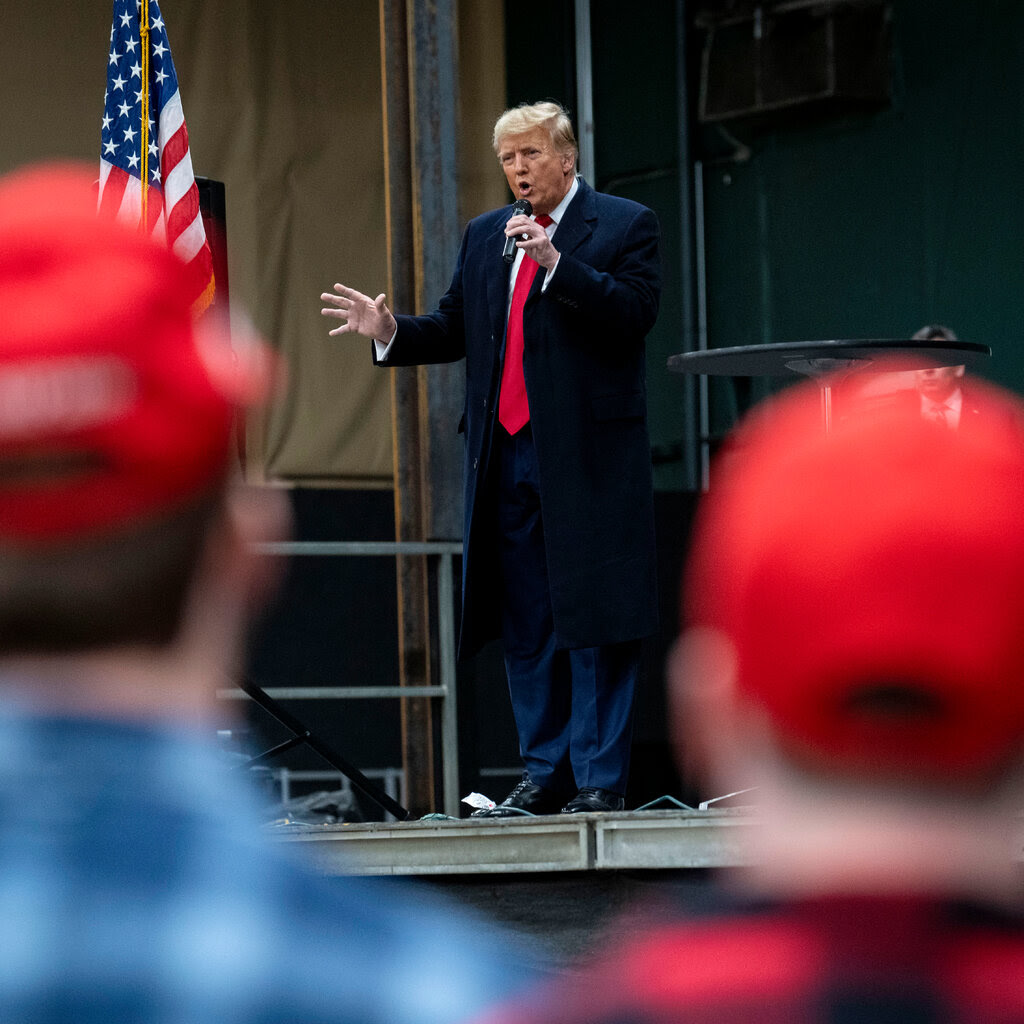
- Former President Donald Trump in Clive, Iowa, on Monday. Doug Mills/The New York Times
- The race for second place in Iowa
Donald Trump won the Iowa caucuses yesterday, the first step in his bid to reclaim the Republican nomination for the third consecutive presidential election. Read our recap.
The victory, called by The Associated Press only 31 minutes after the caucuses had begun, accelerated his momentum toward a potential rematch in November with President Biden that could play out on both the campaign trail and in the courtroom.
Ron DeSantis, who had predicted victory in Iowa, came in a distant second. Nikki Haley finished third, appealing particularly to moderate, suburban and college-educated voters. The result was a setback for both Republicans, who had spent as much time and money battling each other in Iowa as battling the front-runner.
Quotable: In remarks, Trump said he wanted to “congratulate Nikki and Ron for having a good time together.”
Other news: Vivek Ramaswamy, the 38-year-old entrepreneur and political newcomer, dropped out of the race after a disappointing fourth-place finish. - How Trump Sidestepped the Tradition of Iowa Pandering
Presidential candidates often enmesh themselves in the state’s politics to woo voters, but the nature of this race means much less focus on local issues.
https://www.nytimes.com/2024/01/15/us/politics/iowa-caucus-state-politics.html?

Donald J. Trump has run his campaign in Iowa in the style of an incumbent, focusing less on local issues in favor of big, national topics.Credit...Haiyun Jiang for The New York Times
How Trump Sidestepped the Tradition of Iowa Pandering
Presidential candidates often enmesh themselves in the state’s politics to woo voters, but the nature of this race means much less focus on local issues.

![]()
By Anjali Huynh and Kellen Browning
Reporting from Des Moines
- Jan. 15, 2024
Campaigning in Iowa in the months leading up to the caucuses has traditionally involved candidates’ embracing local customs, visiting familiar locations and championing policies aimed at helping the state’s farm-driven economy.
But this year, the Republicans seeking their party’s presidential nomination have largely avoided over-the-top pandering to local priorities — and any such attempts appear not to be as effective as in the past.
That’s largely because former President Donald J. Trump, who has run in the style of an incumbent, has dominated the state while barely setting foot in it. Though he refers to Iowa farmers in his speeches and talks about how he has poured money into the state, Mr. Trump has eschewed the classic retail politicking that is a mainstay of the caucuses in favor of larger rallies while focusing his message more on national issues.
In doing so, Mr. Trump is suggesting that it is perhaps not as necessary to show so much deference to local priorities to score a victory in Iowa — at least, for a former president with a huge following.
 Mr. Trump has held a large polling lead over his rivals in Iowa.Credit...Haiyun Jiang for The New York Times
Mr. Trump has held a large polling lead over his rivals in Iowa.Credit...Haiyun Jiang for The New York Times
“Most of the talk is about border security and the economy and inflation, national issues rather than Iowa-centric,” said Brent Siegrist, a state representative in Council Bluffs. If Mr. Trump was “not in the field, maybe some other issues would have risen to a more prominent role,” he suggested.
Jeff Kaufmann, the chairman of Iowa’s Republican Party, said he was “surprised” that the state of the U.S. border with Mexico, rather than a more local issue, had “vaulted to the forefront” of issues for many voters.
The other candidates have still sought to make Iowa-specific pitches typical of a traditional race. But with Mr. Trump maintaining a nearly 30-point lead over his nearest rival — Nikki Haley, the former governor of South Carolina — in the final Des Moines Register poll before the caucuses, their pitches do not always seem to land. Local issues have instead served more as a differentiator among the candidates competing for second place, rather than part of a winning strategy.
Gov. Ron DeSantis of Florida, who has visited all of the state’s 99 counties and was pinning his hopes on a strong showing in the caucuses, has leaned into proposals aimed at resonating with agricultural communities, such as calling to remove a “death tax” on family farms.
Mr. DeSantis and Ms. Haley briefly sniped at each other over ethanol and agricultural issues during the most recent CNN debate. On Thursday, Ms. Haley took aim at Mr. DeSantis at a biofuels summit for previously supporting legislation to repeal the Renewable Fuels Standard, a popular policy that requires ethanol to be blended into gasoline.

Vivek Ramaswamy has seized on one local issue, planned carbon dioxide pipelines.Credit...Hilary Swift for The New York Times
And Vivek Ramaswamy, the wealthy entrepreneur, has harshly criticized his rivals, including Mr. Trump, by name for not opposing carbon dioxide pipelines that would seize some Iowans’ land via eminent domain.
Yet such sparring seemed almost quaint at a time when Mr. Trump and his legal travails continue to suck up most of the attention.
Monte Shaw, the executive director of the Renewable Fuels Association, said that the lower-polling candidates had “inevitably ended up talking about Iowa issues” by way of engaging with voters at town halls or participating in debates. But, he said, Mr. Trump’s larger rallies, with less voter interaction, had “allowed him to stick to broader issues.”
“It’s not really a typical caucus because you do have a former president running,” Mr. Shaw said. “He does have the ability to come in and draw big crowds,” he said, adding that “that is not your typical Iowa caucus style.”
Still, as Mr. Trump has sought to shore up support in the state, he, too, has made last-minute local pitches. In a video posted by Mr. Trump’s super PAC one day before the caucuses, Mr. Trump said he would “endorse ethanol” because “ethanol endorsed me”— though he presented no specifics about what that would entail in terms of policy.
The heightened attention on national priorities may not make much of a difference to Iowa in the long term. After all, past candidates have, at times, made promises that they seem to forget when the primary calendar moves onward. During former President Barack Obama’s first term, for example, he faced criticism from farming organizations for not fulfilling an Iowa campaign promise to close a loophole that benefited “mega-farms.”
Iowans say the focused attention has largely benefited their state over the years. They point to examples like the appointment of Tom Vilsack, the former governor of Iowa, as agriculture secretary under the Obama and Biden administrations as proof that hosting presidential candidates pays off.
Iowa has influenced policy by forcing candidates to study up on the Farm Bill, a legislative package that oversees agricultural and food programs nationwide. And Terry Branstad, the former governor of Iowa, noted that former President George W. Bush — the last Republican candidate to both win the Iowa caucuses and become the eventual party nominee — was “instrumental” in enacting the Renewable Fuel Standard.
“The use of ethanol under his leadership went way up, even though he’s from the oil state of Texas,” Mr. Branstad said. “That was something Iowans appreciated.”
Mr. Trump often boasts that he gave farmers $28 billion in bailouts to offset any repercussions from trade wars. But his focus on specific issues has been lacking.
But the state’s first-in-the-nation status — only for Republicans this cycle — remains important to lesser-known candidates trying to jump-start their campaigns. David Peterson, a political science professor at Iowa State University, suggested that years before presidential hopefuls join the field, they might consider how they would address agricultural policy and issues that affect rural Americans.
“If you’re a senator from a state that doesn’t have any agriculture, that doesn’t grow any corn, you’ve still got to think about ethanol subsidies, and, ‘Will that hurt me in Iowa?’” Mr. Peterson said. “It’s a cost-less thing to support because your constituents won’t care, but it could potentially be a costly thing to oppose if you end up running for president.”

Mr. Trump has eschewed the classic retail politicking that is a mainstay of the caucuses in favor of larger rallies and focusing his message more on national issues.Credit...Haiyun Jiang for The New York Times
With that in mind, the 2024 candidates have made varying degrees of such promises. Mr. DeSantis has vowed to move the headquarters of the U.S. Department of Agriculture to Iowa. Ms. Haley has made general promises to take on China to “free America’s farmers and ranchers.” And Mr. Ramaswamy has suggested tying the U.S. dollar to agricultural commodities.
This week, Mr. DeSantis, Ms. Haley and former Gov. Asa Hutchinson of Arkansas, a long-shot candidate, appeared at a forum for the Iowa Renewable Fuels Summit to woo farmers, duly voicing their support for all eight parts of a Biofuels Vision plan, including promises to promote renewable fuels and oppose electric vehicle mandates.
However, Mr. Trump, who maintains a commanding lead over his rivals and remains a favorite among Iowa farmers, had not publicly taken a stance on more than half of them.
NEW
More to Discover
More in Politics

US
Key Trump Lawyer Withdraws as Manhattan Criminal Trial Nears
Try Something Different
 Desiree Rios for The New York Times
Desiree Rios for The New York Times
US
In Frigid Texas, Will the Power Grid Be Able to Keep the Heat On? Irving Browning/The New York Historical Society, via Getty Images
Irving Browning/The New York Historical Society, via Getty Images
BOOKS
Could LSD Have Achieved World Peace? Ask Margaret Mead. Gabriel Bouys/Agence France-Presse — Getty Images
Gabriel Bouys/Agence France-Presse — Getty Images
STYLE
Gucci’s Reboot Brings Back Old-School Cool Jason Henry for The New York Times
Jason Henry for The New York Times
BUSINESS
Editors Picks

SCIENCE
The Crochet Coral Reef Keeps Spawning, HyperbolicallyFor more stories, return to home.
Anjali Huynh, a member of the 2023-24 Times Fellowship class based in New York, covers national politics, the 2024 presidential campaign and other elections. More about Anjali Huynh
Kellen Browning writes about technology, the gig economy and the video game industry. He has been reporting for The Times since 2020.
Election 2024
- 5 takeaways from Trump’s runaway victory in the Iowa caucuses.
- The mood at the DeSantis watch party was anger and disbelief — over how fast the call was made.
- Trump invested in a muscular turnout operation, and it paid off.
- Vivek Ramaswamy, a wealthy political novice who aligned with Trump, dropped out of the race.
- News outlets declared Trump the winner even as Iowans were still caucusing.
Our Coverage of the 2024 Presidential Election
News and Analysis
- Former President Donald Trump won the Iowa caucuses in a landslide, with Gov. Ron DeSantis of Florida securing a critical but distant second-place finish. Nikki Haley, the former governor of South Carolina, came in a disappointing third place.
- Vivek Ramaswamy, the wealthy political novice who aligned with Trump, ended his campaign after a fourth-place finish in Iowa.
- Many Iowans had not yet had a chance to cast a vote when The Associated Press and TV networks projected Trump as the winner, half an hour after the caucuses began. The early call prompted a backlash.
Read More
- Being a Regular Joe: For President Biden, retail campaigning isn’t easy, what with the counterassault team that follows him everywhere. But he is starting to hit the hustings on every Main Street he can find.
- Staying Private: DeSantis has made lots of changes to try to revamp his struggling campaign. But the Florida governor rarely tries talking about himself.
- Three Different Styles: Hundreds of events reveal distinct campaigning approaches among Trump, Haley and DeSantis. Here is what it feels like to be on the road with them.
- A Study in Contrasts: Our reporters covering the Haley and DeSantis campaigns switched places. Here’s what they found.
Follow for live updates on the Iowa caucuses.
As Trump Continues to Insult E. Jean Carroll, 2nd Defamation Trial Opens
The writer has already won $5 million for his sexual abuse and his subsequent denials. But the former president still claims he does not know who she is.

E. Jean Carroll is seeking $10 million for statements Donald J. Trump made in 2019.Credit...Kirsten Luce for The New York Times



By Benjamin Weiser, Maggie Haberman and Maria Cramer
Jan. 15, 2024
A Manhattan jury will be asked a narrow question this week: How much money must former President Donald J. Trump pay the writer E. Jean Carroll for defaming her after she accused him of raping her?
Ms. Carroll’s chance encounter decades ago at the Bergdorf Goodman department store, in which she said Mr. Trump shoved her against a dressing room wall, pulled down her tights and forced himself on her, was already the focus of a trial last year. A jury in May awarded Ms. Carroll just over $2 million for the assault and nearly $3 million for defamation over Mr. Trump’s remark in October 2022 calling her claim “a complete con job.”
The trial starting Tuesday focuses on separate statements by Mr. Trump in June 2019, directly after Ms. Carroll disclosed her allegation in New York magazine. At the time, Mr. Trump called her claim “totally false,” saying that he had never met Ms. Carroll, a former Elle magazine advice columnist, and that she invented a story to sell a book.
Now, Mr. Trump says he wants to attend and testify at Ms. Carroll’s trial, something he didn’t do in the earlier case. That’s sparked a bitter dispute between lawyers for Ms. Carroll, 80, and Mr. Trump, 77, over what the former president could say if he took the stand, and whether he would stray beyond strict boundaries the judge has set
The judge, Lewis A. Kaplan, has ruled that given the jury’s findings in the first trial, Mr. Trump cannot now contest Ms. Carroll’s version of events — as he frequently does in public statements.
“Mr. Trump is precluded from offering any testimony, evidence or argument suggesting or implying that he did not sexually assault Ms. Carroll, that she fabricated her account of the assault or that she had any motive to do so,” Judge Kaplan wrote in an opinion on Jan. 9.
The judge had also previously ruled that Ms. Carroll does not need to prove again that Mr. Trump’s comments in 2019 were defamatory, finding they were substantially the same as those that prompted last year’s award.
“This trial will not be a ‘do over’ of the previous trial,” Judge Kaplan wrote on Jan. 9.
Ms. Carroll is seeking $10 million in damages for harm to her reputation, plus unspecified punitive damages, which are intended to deter misconduct.

Roberta A. Kaplan, left, wrote to the judge, saying that Mr. Trump’s “recent statements and behavior strongly suggest that he will seek to sow chaos.”Credit...Anna Watts for The New York Times
Still, Mr. Trump continues to attack her relentlessly, repeating that he had never met Ms. Carroll and denying that he assaulted her. Minutes after the verdict last year, he began to issue a stream of blistering posts on his Truth Social website, and later he went on CNN, where he called Ms. Carroll a “wack job” and said the trial was “a rigged deal.”
In recent weeks, he has escalated those attacks. On a single day at Mar-a-Lago, his Florida estate, he issued a rapid stream of more than 40 derisive Truth Social posts, stunning some advisers with the fusillade. On Jan. 6, while campaigning in Iowa, he said again that Ms. Carroll had faked her story.
Then on Thursday, when Mr. Trump was allowed to speak in court during New York’s civil fraud trial against him, he assailed a judge to his face. Afterward, Mr. Trump announced he would attend Ms. Carroll’s trial, “and I’m going to explain I don’t know who the hell she is.”
On Friday, Ms. Carroll’s lawyer, Roberta A. Kaplan, wrote to Judge Kaplan in federal court, saying that if Mr. Trump appeared at the trial as a witness or otherwise, “his recent statements and behavior strongly suggest that he will seek to sow chaos.”
“There are any number of reasons why Mr. Trump might perceive a personal or political benefit from intentionally turning this trial into a circus,” Ms. Kaplan said. (She is not related to Judge Kaplan.)
Ms. Kaplan asked that the judge, a veteran of nearly three decades on the bench, require Mr. Trump to state under oath that he understands what testimony is off-limits, like claiming he did not rape or know Ms. Carroll or questioning her motives.
Mr. Trump’s lawyer, Alina Habba, responded Sunday in a letter asking the judge to deny Ms. Kaplan’s request, saying it “proposed unprecedented hurdles.”
She said Mr. Trump was “well aware” of the court’s rulings “and the strict confines placed on his testimony.”
“We presume that this is not a kangaroo court of a third-world country,” Ms. Habba added, “where a party to a lawsuit is involuntarily made to say what a court and an opposing party wants them to say.”

Alina Habba, one of Mr. Trump’s lawyers, said her client well understands the judge’s rules. Credit...Jefferson Siegel for The New York Times
Meanwhile, Mr. Trump’s attacks on Ms. Carroll have not ended. On Friday, Judge Kaplan denied Mr. Trump’s request to delay the trial for one week to allow him to travel to Florida for the funeral of Melania Trump’s mother.
Mr. Trump went on Truth Social, calling Judge Kaplan a “crazed, Trump hating Judge” who had presided over an “Election Interference Witch Hunt, disguised as a trial, of a woman I have never met before.”
”Can anyone imagine a husband not going to his wife’s mother’s funeral over a MADE UP STORY,” Mr. Trump blared.
Ms. Kaplan and Ms. Habba have declined to comment about the case in recent days. Legal experts, though, have been puzzling over Mr. Trump’s approach.
Rebecca Roiphe, a New York Law School professor who studies the legal profession, said, “Whenever I can’t figure out a Trump legal strategy, I usually think it’s not a legal strategy but in fact a public relations strategy.”
Mr. Trump probably assumes he will lose, she said. “He just wants to claim that this is a political hit job, and so he’s giving himself the material with which to do that.”
As for Ms. Carroll, a substantial punitive damages award could be the most effective way to stop Mr. Trump’s attacks, said Chris Mattei, a lawyer who in 2022 helped the families of eight people killed in the 2012 mass shooting in Newtown, Conn., win $1.4 billion from Alex Jones, the Infowars conspiracy broadcaster.
“You would expect Ms. Carroll to present all the evidence available to her,” Mr. Mattei said, “to show that Donald Trump is recalcitrant and determined to continue to harm her.”
Ben Chew, a Washington, D.C., lawyer who represented the actor Johnny Depp in a defamation case against his ex-wife, said money is Mr. Trump’s vulnerable spot.
“It’s really the only avenue through which the court or the jury can put an end to this,” he said.
Mr. Trump has long been furious about Ms. Carroll’s allegations, and in private, he has repeatedly railed against her.
In the trial last spring, Ms. Carroll testified that the attack at Bergdorf’s came after she bumped into Mr. Trump one evening, and he asked her to help him buy a present for a female friend.
They ended up in the lingerie section, where he motioned her to a dressing room, shut the door and began assaulting her. Using his weight to pin her, he pulled down her tights and forced his fingers and then, she said, his penis into her vagina. The jury did not, however, find he had raped her.
Judge Kaplan has ruled that because the jury found that Mr. Trump had used his fingers to assault her, her rape claim was “substantially true under common modern parlance.”
Kellen Browning contributed reporting from Newton, Iowa, and Susan C. Beachy contributed research.
NEW
More to Discover
More in New York

NYREGION
Investigators Find Hospital Error Caused Mother’s Death in Brooklyn
Try Something Different
 Jefferson Siegel for The New York Times
Jefferson Siegel for The New York Times
US
Key Trump Lawyer Withdraws as Manhattan Criminal Trial Nears Joyce Lee for The New York Times
Joyce Lee for The New York Times
WELL
How Much Water Do I Need to Drink? Sarah Rice for The New York Times
Sarah Rice for The New York Times
ARTS
The Man in the Sequined Tuxedo Who Built a Dance  Mohammed Hajjar/Associated Press
Mohammed Hajjar/Associated Press
OPINION
The Things We Disagree on About
Editors Picks

SCIENCE
The Crochet Coral Reef Keeps Spawning, HyperbolicallyFor more stories, return to home.
Benjamin Weiser is a reporter covering the Manhattan federal courts. He has long covered criminal justice, both as a beat and investigative reporter. Before joining The Times in 1997, he worked at The Washington Post. More about Benjamin Weiser
Maggie Haberman is a senior political correspondent reporting on the 2024 presidential campaign, down ballot races across the country and the investigations into former President Donald J. Trump. More about Maggie Haberman
Maria Cramer is a Times reporter covering the New York Police Department and crime in the city and surrounding areas. More about Maria Cramer
What to Know About E. Jean Carroll’s Accusations
Card 1 of 5
Two lawsuits. E. Jean Carroll, a writer who says Donald Trump raped her in the mid 1990s, filed two separate lawsuits against the former president. Here’s what to know:
How Trump, DeSantis and Haley’s Teams Are Thinking About Turnout in Iowa
Republican campaigns are battling cold, complacency and voter discontent as they push voters to caucus on Monday.

Campaigns are struggling to predict how many voters may show up to caucus during dangerous winter weather in Iowa.Credit...Hilary Swift for The New York Times 

By Jonathan Swan and Charles Homans
Jonathan Swan reported from Des Moines and Urbandale, Iowa. Charles Homans reported from Waukee and Waterloo, Iowa.
Jan. 15, 2024
Nikki Haley’s team predicts Iowans will brave brutal weather to caucus for her. Aides to Ron DeSantis say the subzero temperatures give their candidate an edge because he has the biggest team knocking on doors. And the Trump team says they don’t worry about the cold — former President Donald J. Trump’s supporters will “walk through glass” to caucus for him.
The truth: No one really knows what to expect on Monday night when Iowans become the first to weigh in on the 2024 presidential election. An already unpredictable and quirky process is even more so this year, thanks to dangerously cold weather and an unusually uncompetitive contest.
Until recently, both the Trump and DeSantis teams had been privately preparing for an enormous turnout of more than 200,000 caucusgoers, a figure that would eclipse the party’s previous record of 187,000 in 2016. But as the winter storm blew in last week, nobody from any of the leading campaigns wanted to attach their names to a firm prediction.
The National Weather Service forecast subzero temperatures in Des Moines, with wind chills dropping to as low as minus 30 degrees on Monday.
This year’s caucuses are unusual for many reasons beyond the weather. A contest known for elevating long shots has been dominated by the former president for months. What suspense is building is not about the winner, but about the margin of victory and who claims second place.
That has given the affair a subdued, sedated feel. Interviews with voters across the state reveal many are unhappy with their choices, and feel that they’re going through the motions in a simulation of a contest.
Brian Bean, an insurance company owner in Waukee who caucused for Mr. Trump in 2016, is not caucusing, he said, citing concerns about some of Mr. Trump’s recent speeches and a field of other candidates that had left him unimpressed. While he expects to vote for Mr. Trump in November if he is the Republican nominee, “What bothers me about him is he’s not denying that he won’t be vindictive if he’s elected,” Mr. Bean said. “And I’ve got a problem with that.”
 A volunteer assembling Trump campaign yard signs in Urbandale, Iowa.Credit...Jon Cherry for The New York Times
A volunteer assembling Trump campaign yard signs in Urbandale, Iowa.Credit...Jon Cherry for The New York Times
Some of the discontent is distinctly Iowan, said Bob Beatty, a political science professor at Washburn University in Topeka, Kansas, and an expert on the Iowa caucuses. Voters in the state delight in being courted by candidates and wielding their perceived influence. (In reality, Iowa Republicans have a poor record of picking the recent nominees.)
This year, Iowans have been effectively stripped of their role by Mr. Trump’s apparent advantage — a key poll published Saturday showed him winning 48 percent — and lack of interest in the storied traditions of campaigning in Iowa. Mr. Trump’s campaign in the state has been limited to large rallies and he didn’t participate in any of the primary debates.
“He’s not shaking hands, and he’s not taking questions,” Mr. Beatty said. “Trump is campaigning as an incumbent, and it’s half working. And if you get half, that’s it.”
Encapsulating the local malaise — albeit from the anti-Trump perspective — the Raygun clothing store in Des Moines is selling T-shirts with the slogan: “Election 2024: You’d think battling a fascist takeover of America would spark more interest from people.”
David Kochel, a longtime Iowa political strategist, predicted about 150,000 Iowans would show up on Monday, a figure in line with historical norms, but still just about 25 percent of the registered Republicans in the state. He cited Mr. Trump’s lead and the weather as the biggest factors.
“Iowans can go out when it’s 15, 20 degrees, no problem. They do it all the time, all winter long,” Mr. Kochel said. But when it’s “10 below, 20 below — that can get dangerous for people. I mean, cars don’t start, elderly people, frostbite.”
Voters cannot participate on their own schedule. To caucus, voters must show up at their local caucus site at 7 p.m., listen to speeches from candidates’ supporters and write down their preference. The process can be quick — or not.

The National Weather Service is projecting wind chills as low as minus 30 degrees in parts of Iowa on Monday.Credit...Hilary Swift for The New York Times
Some would-be caucusgoers, looking at the forecast, were having second thoughts.
Anthony O’Malley, 61, a retired Army veteran and a Republican-leaning independent in Waterloo, said he was considering registering as a Republican in order to caucus on Monday, and was deciding between Mr. Trump and Ms. Haley. But the combination of a recent surgery and the weather had changed his mind.
“It ain’t worth it,” he said.
Mr. Kochel, who is not aligned with a campaign, said he believed lower turnout would benefit Mr. Trump’s rivals. Polls show Mr. Trump is more popular with people who are considering caucusing for the first time this year, a group that might be easily deterred by the weather.
That’s a view shared by the DeSantis operation, which has spent weeks boasting of its get-out-the-vote machine. The well-funded super PAC backing the governor, Never Back Down, has spent tens of millions of dollars on voter outreach in the early states — outspending any of Mr. DeSantis’s rivals. Over the past seven months the DeSantis super PAC has identified every potential DeSantis voter in Iowa and visited their homes multiple times. It has collected reams of data on these voters, studied what would be required to get them to caucus for Mr. DeSantis — whether they need a ride or some extra encouragement from a neighbor. It says it has enlisted 1,600 precinct captains ready to organize caucusgoers on Monday.
An adviser for the Trump campaign, Chris LaCivita, scoffed at the idea that bad weather was good for Mr. DeSantis.
“It’s laughable that weather would have a greater impact on first-time caucusgoers,” Mr. LaCivita said, claiming the campaign’s voters had an extraordinary level of commitment. “When Trump says most people will walk through glass to vote for him, he’s not joking.”
Asked whether the Trump campaign was doing anything to ensure their voters showed up to caucus in the subzero temperatures, Mr. LaCivita said that months ago they began recruiting drivers with four-wheel-drive vehicles to give neighbors rides to caucus sites.
Mr. Trump’s campaign has been outspent by Mr. DeSantis. But, unlike in 2016, when Mr. Trump lost Iowa to Senator Ted Cruz of Texas, the former president has built a professional campaign operation.
The campaign says it has around 2,000 caucus captains — identifiable by their signature gold and white caps, which have already become a coveted collector’s item in Iowa political circles. Many of these volunteers have been given formal training and each has been tasked with bringing 10 Iowans to caucus for Mr. Trump.

Voters listened to Ron DeSantis speak in Council Bluffs, Iowa, on Saturday.Credit...Jordan Gale for The New York Times
Mr. Trump also benefits from intensely loyal fans, some of whom have driven many miles to help him out, without having any contact with the campaign.
Edward Micheals, a 66-year-old truck driver, said he drove from his home in Dallas, Texas, to volunteer. “We don’t want to take any chances,” he said in an interview at the Machine Shed restaurant in Urbandale on Thursday, where the former president’s eldest son, Donald Trump Jr., rallied supporters.
Amid all of this uncertainty, the biggest wild card is Ms. Haley.
Until late November, she had almost no campaign staff on the ground in Iowa. But then the political network founded by the billionaire industrialist brothers Charles and David Koch endorsed her and handed over their organizational muscle and financial heft. The group, Americans for Prosperity Action, has been knocking doors across Iowa for Ms. Haley, trying to reassemble the coalition of wealthier, college-educated Republicans that brought Senator Marco Rubio of Florida close to victory in a fast finish in the 2016 Iowa caucuses.
The weather may play to her advantage with that group. Those voters are concentrated in urban areas, where roads have been cleared and it will be easier for them to get to a caucus site. It’s unclear which factor will matter more in her fight with Mr. DeSantis for second place.
“If you put a gun in my head right now, I would probably rather be Nikki Haley because she has had the better trajectory than DeSantis over time,” said Mr. Kochel, the political strategist, referring to the battle for second place. “But boy, I wouldn’t bet a mortgage payment on it right now.”
Reporting was contributed by Jazmine Ulloa, Reid J. Epstein, Kellen Browning and Lisa Lerer.
Jonathan Swan is a political reporter covering the 2024 presidential election and Donald Trump’s campaign. More about Jonathan Swan
Charles Homans is a reporter for The Times and The Times Magazine, covering national politics. More about Charles Homans
Jan. 16, 2024,
- 5 takeaways from Trump’s runaway victory in the Iowa caucuses.
- The mood at the DeSantis watch party was anger and disbelief — over how fast the call was made.
- Trump invested in a muscular turnout operation, and it paid off.
https://www.nytimes.com/2024/01/15/us/politics/iowa-caucus-donald-trump-voter-turnout.html?
Get in touch with us today and let us help you take your business to the next level.
Learn about our company history, our mission and vision, and the team behind USA Weekly News.
Email: INLWorldNews@inltv.co.uk
93 Cambridge Street
Mitchell
Queensland
Australia
4465
Copyright © 2024 USA Weekly News - All Rights Reserved.
This website uses cookies.
We use cookies to analyze website traffic and optimize your website experience. By accepting our use of cookies, your data will be aggregated with all other user data.
